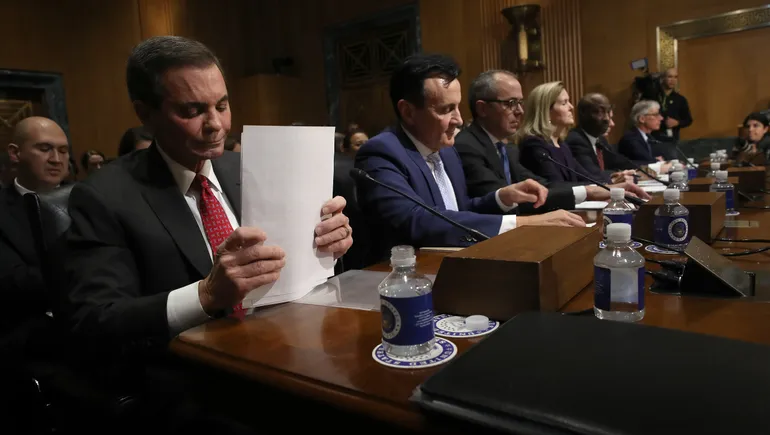AbbVie CEO Richard Gonzalez leaves a divisive Humira legacy and lasting impact on pharma

After more than a decade at the helm, AbbVie CEO Richard Gonzalez announced this week he will be stepping down in the summer, ending a tenure marked by the unparalleled ascent of the leading blockbuster Humira and a successful Allergan megamerger — as well as a string of controversies around patents and pricing.
Under Gonzalez’s leadership, AbbVie became one of the largest pharmaceutical companies in the world after spinning off from med tech Abbott Laboratories in 2013. Gonzalez, who worked at Abbott for three decades, is AbbVie’s first and only CEO, and will be succeeded by Robert Michael, the company’s current chief operating officer.
Most recently, Gonzalez has put AbbVie on track to recover from Humira biosimilar competition that hit the U.S. last year following a period of protection behind what many called a “patent thicket” — Humira was often the prime example of the dense web of patents that some companies have used to hold onto market exclusivity.
But with new Humira-like immunology blockbusters such as Skyrizi and Rinvoq carrying their own weight now, and a series of company-building acquisitions that stocked the pipeline, Gonzalez will likely leave behind a new chapter for AbbVie despite the decline of the Humira era.
Here, we’re exploring some of the actions Gonzalez has taken in the last 11 years to grow AbbVie as well as the areas he went toe-to-toe with criticism regarding the company’s outside-the-box methods.
AbbVie’s thriving decade
Gonzalez’s time at AbbVie was indisputably one of the most successful growth stories in pharma, with more than 700% return to shareholders, $250 billion in market valuation and $60 billion invested in R&D, according to the company’s lead independent director Glenn Tilton in a statement.
Humira, acquired by Abbott in 2001 and first approved by the FDA in 2003, already raked in sales of $10.7 billion worldwide in AbbVie’s first year as an independent spinoff in 2013. By 2022, annual sales reached $21.2 billion before declining in 2023 due to biosimilar entries.
Added up, Humira alone has brought in more than $200 billion for AbbVie over the course of its lifetime. And AbbVie also built up a reputation in other areas along the way, in oncology with the treatments Imbruvica and Venclexta and the neuroscience drug Vraylar, as well as the aesthetic and neurologic blockbuster Botox, acquired in the $63 billion purchase of Allergan in 2019.
Beyond the Allergan megadeal, Gonzalez wasn’t shy at the M&A table, pulling off major deals to bring more science under AbbVie’s umbrella. Prior to the Allergan deal, AbbVie spent $21 billion for cancer drugmaker Pharmacyclics in 2015. More recently, within the span of a week toward the end of 2023, AbbVie announced the $10 billion acquisition of oncology drugmaker ImmunoGen and the $8.7 billion purchase of neuroscience-focused Cerevel Therapeutics.
No shortage of controversy
The era of Gonzalez’s leadership wasn’t without controversy, and his efforts to defend the company have left an indelible mark on the industry overall.
Criticism of AbbVie’s legal practices to protect Humira behind a wall of hundreds of patents brought unwanted attention from politicians, lawmakers and investors. Some in the industry have even blamed AbbVie for the pricing backlash that led to measures in the Inflation Reduction Act allowing Medicare to negotiate drug costs. Alnylam Pharmaceuticals founder John Maraganore called AbbVie’s practice “so egregious that I think it angered a lot of policymakers,” in a Wall Street Journal report this year.
Gonzalez stood shoulder to shoulder with pharma peers like Eli Lilly CEO David Ricks, former Merck & Co. CEO Kenneth Frazier and more to defend the industry’s approach to pricing in front of lawmakers.
Gonzalez found himself testifying to Congress on several occasions to defend the company’s practices and those of the industry. Lawmakers like Sen. Bernie Sanders (I-Vt.) have blamed high drug costs on factors like executive compensation, pointing specifically to Gonzalez as an example. In 2022, Gonzalez made more than $26 million in compensation.
For the rest of the pharma industry, AbbVie’s success during the Gonzalez years showed pharmas how to build massive revenue behind a single product — but whether AbbVie’s pricing tactics shut the door behind them will remain to be seen as the industry fights further regulation.
Source link
#AbbVie #CEO #Richard #Gonzalez #leaves #divisive #Humira #legacy #lasting #impact #pharma